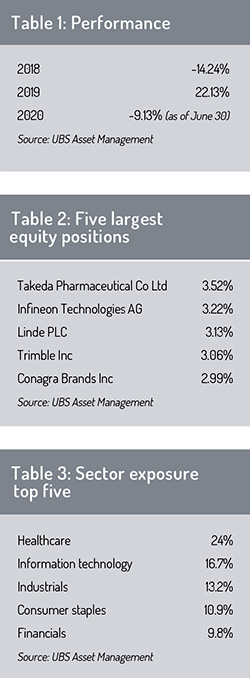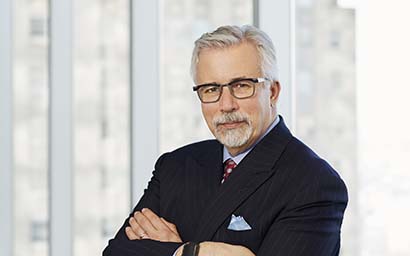Three years on from the launch of UBS Asset Management’s global equities impact strategy, Alex Rolandi analyses its performance and speaks with fund manager Bruno Bertocci about his hopes for the fund.
Finding the balance between generating returns and making a positive social and environmental impact is no easy feat. There remain many challenges to overcome.
It’s still early days for impact investing in public equity, says Bruno Bertocci, fund manager of the UBS (Lux) Equity Sicav – Global Impact Fund, and head of the sustainable equity team at Zurich-headquartered UBS Asset Management (UBS AM).
To set up the fund, UBS AM worked alongside scientists to develop a bespoke methodology that measures the positive impact of equities on issues “fundamental to impact investing” such as climate change, air pollution, clean water and water scarcity, treatment of disease and food security.
Tracking the MSCI All-Country World index, the Luxembourg-domiciled fund has been on a bumpy road since its inception.
Nearly three years on from its launch in October 2017, overall average performance was at roughly -2% as of the end of June. Turmoil caused by the pandemic has played a particular role in this recently.
“The results are promising but mixed, especially given that the market has been dominated by huge tech companies that are not part of any impact-investment universe,” Bertocci tells Funds Europe from Chicago.
Year-to-date, the fund is performing at -9.13%, according to data from UBS AM. In 2019, however, performance was strong at over 22%.
This year has been challenging, he explains, with large-cap stocks dominating performance and smaller and mid-size stocks lagging. “In that sense, it’s been tougher for us.”
Off-limits
These large parts of the investment universe occupied by tech giants and the like are essentially off-limits to impact investors. One of the key aspects of impact investing is measurability, after all. Measuring the broader impact of certain companies is complex, even when some elements of the business model are making positive change.
“If you wanted to measure the external impact of some of the giant companies, you’d discover that the management is somewhat insular and they’re not going to help that much. Whereas with a smaller to mid-size company, you would most likely have better engagement – they’re going to be more receptive,” Bertocci says.
According to him, key factors that influence the success of an impact fund include intentionality, measurability and verifiability. But the fund needs to prove that it can compete with the benchmark using the impact approach.
In the past 24 months or so, large-cap stocks have outperformed small to mid-cap stocks by a “vast” margin, he adds. “That’s been another challenge for impact investing. It will rectify itself over time. This year we’ve just had to suck it up and wait. To be honest, there’s not much you can do to mitigate the lack of exposure to these mega tech stocks.”
The fund invests in a number of IT stocks, but they’re different in the way that they focus on the industrial side of things. “You’ve just got to wait, because the stocks that we’re competing with have sky-high valuations, but I expect that to change.”
 Investors in the fund are patient and understand that the investment strategy is long-term, Bertocci says.
Investors in the fund are patient and understand that the investment strategy is long-term, Bertocci says.
He does believe stocks in the fund’s portfolio will perform well in the long run. The market has also seen an influx of capital coming from momentum-chasing individuals and hedge funds.
“The kind of companies we own, more geared to the tech supply chain, like Infineon, haven’t performed quite as well,” he says.
One firm of note in the portfolio is Takeda Pharmaceuticals, the fund’s largest equity position. Not only is it interesting as a company in transition, but there are also oncology and healthcare products in the pipeline that look very promising in terms of their potential impact, according to Bertocci.
He describes Takeda as a “transforming business” that is “in the process of improving” with interesting products due for launch, such as a vaccine for dengue fever.
Another is the chemical company Linde, noted for its work with hydrogen – an evolving source of power for transport, and for power generation. “Up to now, the technology of hydrogen-powered vehicles has been that they’re considerably more expensive, but it’s changing very quickly,” he explains.
As Bertocci is keen to stress, impact investing is still in its early days – but it has been gaining traction, especially with the “popularisation” of the UN’s sustainable development goals. Data from UBS AM shows that assets in impact-investing strategies more than doubled from 2018 to 2019, to $502 billion (€425 billion).
“That evolution has been somewhat interrupted by the pandemic as people are afraid of getting in the market, or they’re unsure about what to do with their capital and so on, but we’ll be back to something that looks more like normal in 2021 at some point.”
He believes a vaccine for Covid-19 will be widely available within a year and that people will look back on impact investing as something that can tackle the world’s problems.
“It took a long time for sustainability to take on. People really doubted it in the beginning,” he adds, “and I think this will take a similar tack.”
© 2020 funds europe





